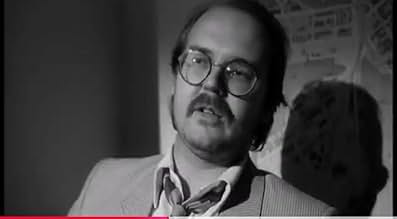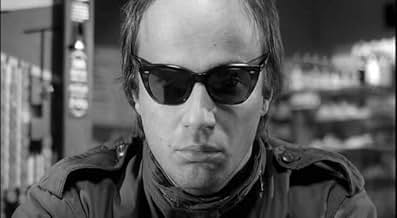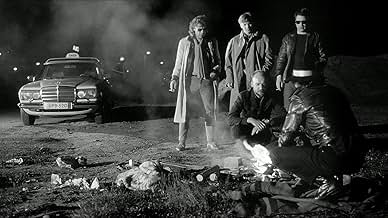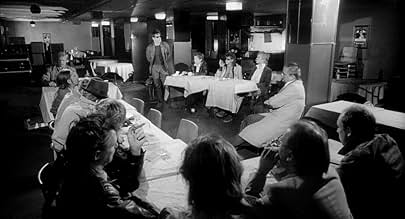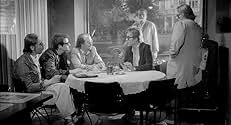IMDb रेटिंग
6.9/10
4.3 हज़ार
आपकी रेटिंग
अपनी भाषा में प्लॉट जोड़ेंAn exodus to a better life in Eira. A group of med - all but one - called Frank, seek refuge from their boring lives in an oasis on the other side of the city, having to overcome obstacles o... सभी पढ़ेंAn exodus to a better life in Eira. A group of med - all but one - called Frank, seek refuge from their boring lives in an oasis on the other side of the city, having to overcome obstacles on their way.An exodus to a better life in Eira. A group of med - all but one - called Frank, seek refuge from their boring lives in an oasis on the other side of the city, having to overcome obstacles on their way.
Sakari Kuosmanen
- Frank Armoton
- (as Saku Kuosmanen)
Tuomari Nurmio
- Taksikuski
- (as Hannu Nurmio)
फ़ीचर्ड समीक्षाएं
After seeing most of Aki Kaurismäki's films and then veering back to his second film, it almost felt like I was watching an all-star cast because most of the actors he collaborated throughout his career is here. And, boy, did I miss my favorite Finnish actor, Matti Pellonpää.
I'm just happy Kaurismäki didn't continue directing while drunk.
It also reminded me of Reservoir Dogs. Did Tarantino saw this movie?
I'm just happy Kaurismäki didn't continue directing while drunk.
It also reminded me of Reservoir Dogs. Did Tarantino saw this movie?
Finnish film "Calamari Union" is not at all a motion picture with a defined setting.It is more of a visual experience with surreal touches which must be seen many times to feel the plight of hapless rock musicians in an urban milieu.In "Calamari Union",there is also a minor battle of sexes to be witnessed as most of the women get their demands met by hapless,vulnerable men.Women are shown as strong willed individuals who would not stop at anything to humiliate, scorn confused men who are treated as mere caddish oafs.Rock music is also one of this film's leading element which reveals the hidden talent of some vagrant musicians.There are some mellifluous tunes which could easily be lapped up by music lovers.No talented film director in the history of modern cinema has come even remotely closer to Finnish author Aki Kaurismaki's vision of urban angst.This is a director who has made an absolutely wise use of his hometown Helsinki and its nocturnal atmosphere by shooting in pristine black and white.He shows why some people are not able to put any order in their utterly disorganized,messy lives.A unique film which is absolutely needed for those nihilists who believe that they are part of existential times.PS:A great film dedicated to Baudelaire,Michaux and Prévert who still hover on earth.Lalit Rao does not care if non Francophones are not aware of Baudelaire,Michaux and Prévert.
Kaurismaki followed on the dour and heavy drama of his debut Crime and Punishment with the often funny, significantly more light-hearted, absurdist fare of Calamari Union. Fifteen guys named Frank and their retarded companion Pekka (who speaks English for some reason) decide to leave their seedy downtown neighborhood and dead-end lives behind and move to the suburb of Eira, on the other side of the city. Eira immediately acquires a quasi-mythic status, equal parts promised land and elysian fields, and their trip through the hostile, soulless city landscape is beset with hardships worthy to a trip filled with such religious allegories.
There's not much of a plot to speak of. The Franks make their way through the city and is every man out for himself. Once in a while they stop to comment on their surroundings, sleep in phone booths, trees and other strange places, offer nuggets of wisdom about vanity, inactivity, time and age, part scathing social critique and part insights into human nature; they also stop to hijack members of the parliament, a hearse, get free rides in a taxi or on top of a car, sleep in a beach or under a table and last but not least, die funny or just plain random deaths.
That is Calamari Union in a nutshell and there lie both its charms and failures. It has the improvised feeling of a freejazz piece - like them, sometimes it works, sometimes it doesn't. It can be inspired, infectiously cool and funny but it can also be meandering and aimless. You take the good with the bad I guess.
There's not much of a plot to speak of. The Franks make their way through the city and is every man out for himself. Once in a while they stop to comment on their surroundings, sleep in phone booths, trees and other strange places, offer nuggets of wisdom about vanity, inactivity, time and age, part scathing social critique and part insights into human nature; they also stop to hijack members of the parliament, a hearse, get free rides in a taxi or on top of a car, sleep in a beach or under a table and last but not least, die funny or just plain random deaths.
That is Calamari Union in a nutshell and there lie both its charms and failures. It has the improvised feeling of a freejazz piece - like them, sometimes it works, sometimes it doesn't. It can be inspired, infectiously cool and funny but it can also be meandering and aimless. You take the good with the bad I guess.
This film, from the beginning of Kaurismäki's career, reminded me, to a certain extent, of another iconic film about the lost illusions of the 60s and 70s generations, The Wretches Are Still Singing, by the Greek Nikos Nikolaidis.
Of course, Nikolaidis's cinematic language is much more caustic and corrosive. Kaurismäki is faithful to his minimalist principles, as a poet of the absurd. But the essential theme is the same: a lost generation, overtaken by events, that searches, in vain, for a meaning in life in the technocracy that emerged from the rubble of the revolution (real or imaginary).
If Nikolaidis is destructive (and he would be even more so in 1983's Sweet Bunch, in which he practically defends urban guerrilla warfare) Kaurismäki is poetic, transforming disillusionment into a chimerical search for the mythical Eira, Holy Grail of aimless knights, survivors of punk nihilism.
An interesting and original work, even for those who already know Kaurismäki's minimal cinematographic language.
Of course, Nikolaidis's cinematic language is much more caustic and corrosive. Kaurismäki is faithful to his minimalist principles, as a poet of the absurd. But the essential theme is the same: a lost generation, overtaken by events, that searches, in vain, for a meaning in life in the technocracy that emerged from the rubble of the revolution (real or imaginary).
If Nikolaidis is destructive (and he would be even more so in 1983's Sweet Bunch, in which he practically defends urban guerrilla warfare) Kaurismäki is poetic, transforming disillusionment into a chimerical search for the mythical Eira, Holy Grail of aimless knights, survivors of punk nihilism.
An interesting and original work, even for those who already know Kaurismäki's minimal cinematographic language.
Following up a successful first movie can be a difficult struggle; Kaurismäki deflected it after "Crime And Punishment" by quickly doing this one, completely different and very funny. We're treated to a number of Finnish derelicts and lower-class guys in a poor suburb of Helsinki, as they decide to mount an expedition to reach the Mayfair of the city (just get there, that is). You'll immediately notice that they talk of this as if there lay a strange and superhuman challenge in just reaching the place. As their trials begin, we realize that maybe Helsinki _is_ a really dangerous city.
The film is full of scenes of weird comedy and pinpoint satire, and as an extra accent every one of the men is called Frank, except one. The film really rocks, and you'll keep wondering what happens next.
The film is full of scenes of weird comedy and pinpoint satire, and as an extra accent every one of the men is called Frank, except one. The film really rocks, and you'll keep wondering what happens next.
क्या आपको पता है
- ट्रिवियाThe first movie ever to include scenes in the Helsinki underground, opened in 1982.
- गूफ़The Director is seen in reflection of Frank's (Sakke Järvenpää) sunglasses in "My friend got sick, can you help us" scene.
- क्रेज़ी क्रेडिटThe film has virtually no credits at all. There are no opening credits, and in the end, only the text "Loppu" and the production company's name are seen.
- इसके अलावा अन्य वर्जनAll the scenes are intact, but the title card and opening credits are missing from the 2013 (1.85:1) HD master, which is featured in the Finnish streaming service Yle Areena and subsequent Finnish/international television, DVD and Blu-ray releases. The credits originally appear during the early scenes where the "Frank's" initially leave, walk out and past the Kallio Church (followed by a wider shot of the city of Helsinki) and enter the underground metro station. All credits are intact in the older, pre-2013 television airings and home video releases.
- कनेक्शनFeatured in Keskiyön auringon kuvat (1987)
- साउंडट्रैकAlkutekstimusiikki
Composed by Aki Kaurismäki
Arranged by Mikko Mattila and Jone Takamäki
Performed by Casablanca Vox and Jone Takamäki
Saxophone: Jone Takamäki
Drums: Kaleva Raittinen
टॉप पसंद
रेटिंग देने के लिए साइन-इन करें और वैयक्तिकृत सुझावों के लिए वॉचलिस्ट करें
- How long is Calamari Union?Alexa द्वारा संचालित
विवरण
- चलने की अवधि1 घंटा 21 मिनट
- रंग
- ध्वनि मिश्रण
- पक्ष अनुपात
- 1.66 : 1
इस पेज में योगदान दें
किसी बदलाव का सुझाव दें या अनुपलब्ध कॉन्टेंट जोड़ें




